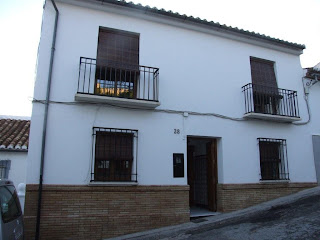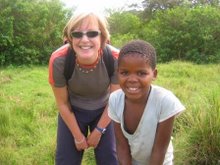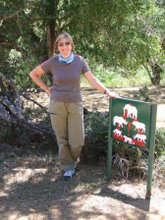And yes, it's different to home. For a start this town is very 'churched'. Apparently one of the first places to despatch the Moors back over the Straits of Gibralter to Africa, Antequera responded by building churches a plenty to reinforce the point. We have around 24 I think, plus seven convents. This leads into the next famed activity - Antequeran sweets (or dulces). The nuns have made them for centuries as a way of earning money, and now the town is littered with shops selling mollettes, bienmesabe, and all kinds of delicious and ultimately fattening goodies.
A local panaderia with a window full of turron, mantecadas and other things on the top of the food pyramid.
Cuesta Real has a church (and a bar) at each end. San Juan is first off the mark with its church bells, which start chiming at 8am and then half-hourly till midnight. Shortly afterwards, though not in sync, is Santa Maria at the top of the hill. It's particularly noisy on Sundays, and I'm just wondering how Easter (or Semana Santa, literally 'holy week') in this part of the world will be - the event is apparently huge here.

Looking down the hill to San Juan's - one of our bell ringing neighbourhood churches. The silver car is parked outside our place.
There has already been one procession, honouring Nuestra Senora del Rosario, where a statue from one of the churches is paraded around the streets (no mean feat given the hills and cobblestones), accompanied by a band and the congregation. All very picturesque, colourful, and again, quite unlike you'll see in Wellington.


The faithful carrying around this beautiful statue one Sunday morning.


The faithful carrying around this beautiful statue one Sunday morning.
There are many things the Spanish do very well - I like the way the roundabouts are planted with olive trees, and the public gardens and streets have rows of orange trees, currently in full fruit. We get home-delivered bread from a local baker every day or two, potatoes and newspapers come direct and our empty gas bottles (which we rely on for cooking and heating the water) are picked up and replaced with full ones by a man who drives around the streets looking for bright orange bottles left on front door steps. On a more mundane note, collecting the rubbish is an art form. There are two bins across the road from our house, one for recycling and the other for general rubbish. The service is brilliant; they are emptied every evening, at midnight! It means that rubbish is easy to dispose of and never gets manky in the bin outside the back door, but the midnight collection - a noisy affair, which takes place just outside our bedroom window - took a bit to get used to. We have decided that if we just do things two hours later than we would have at home, we will be just about right. So that's breakfast at 10, lunch at 3, and dinner at 9; we're still on the early side for most things, but it's a start.

Orange trees line the main street of town, sadly the fruit seems to be ruined by bird poo, rather than eaten.
There are a few chicas in the street who find it amusing to chat with us. My offer to give free English lessons at the local community centre has yet to be formalised, but in the meantime they gather on the wall across the road most evenings for a few words. I'm sure I'll learn a lot from them if nothing else.
There are a few chicas in the street who find it amusing to chat with us. My offer to give free English lessons at the local community centre has yet to be formalised, but in the meantime they gather on the wall across the road most evenings for a few words. I'm sure I'll learn a lot from them if nothing else.

Our daily routines are slowly coming together. Not having a car means most days we go into the town (a few minutes walk from the house) to buy groceries and have coffee. Mercadona has become our favourite supermarket, and Cafe del Centro one of our favourite cafes.


Mercadona, on Antequera's main street, Infante Don Fernando, stocks a good range of beers and other life staples, and also has nifty trolley/baskets on wheels.
Max expertly ordering a couple of cafe con leches, in Cafe del Centro, one of Antequera's oldest cafes which not only boasts 34 varieties of hot chocolate, but also free wifi.
We have Spanish classes three evenings a week - on Mondays Paco teaches us at the immigrants centre, and on Wednesday and Thursdays it's down to the Red Cross where Belen & Jose Antonio take turns with us. We are joined in these classes by people from France, Brazil, Romania, Morocco and Sao Tome and Principe. An international group indeed - and on Friday morning we go to the Evangelical Church where Paco takes us again, together with some other English-speakers who are church attendees. Along with our own studies, and some help from a great internet site called http://www.notesinspanish.com/ (a tip for those of you contemplating a visit), and of course our deep immersion, we are both making progress. But it is not easy - some days I understand nearly everything, and others almost nothing. Even our teachers don't always agree about how to pronounce things, and there's the speed, the dropping off of endings and colloquialisms to cope with too. Not for the first time, I find myself admiring greatly anyone who can converse easily and effectively in more than one language. These classes are all free, part of the local council's eforts to integrate migrants into the community (on the premise I suspect that we are all here legally!).
We have taken to going to Casa Diego to watch the European football; even though we're in the heart of Andalucia, Sevilla is not the team of choice. Real Madrid has a strong following here, and Barcelona would be the next favoured team. The bar is small, homely and family-run, and also very reasonably priced! We stumbled upon it when we were staying at the Reyes, and Diego is so kind we have made it one of our regulars. It's a great place to drop into for a glass of wine and a bowl of olives after Spanish class, and the tapas are really good there too. Diego is very encouraging of our efforts to speak the language, talking slowly and loudly for us, much to the amusement of his other more authentic locals.
Diego, Senora Diego, and Dani, their son - the place is lovely, but everything is done at a very Spanish pace so it's best not to be in a hurry.
Thursday nights we head to Manolo Bar. It's been around since 1950 and on Thursdays they have live music, or, disconcertingly, stand up comedy, which we haven't dared go to. Things hot up around 11pm, so to fill in some time between Spanish class (for Max) and yoga class (for me) we usually go to Diego's for tapas. Yoga classes are relatively new, another activity organised by the very busy Antequera council. It's amazing how similar they are to classes at home - the same sorts of people, the same sorts of asanas, except that our venue is a dance hall which means there are a large number of mirrors, something I'm not used to. Maria is also a bit of a worry - she comes to class with her text book, which she studies and reads out bits of to us. I've learned lots of body parts going to these classes, and after a couple of weeks am starting to chat to a few people which is nice. Meditating has never been my strong point, and it's even more challenging with Maria murmuring soothing mantras to us, which I of course am furiously trying to translate while 'thinking of nothing', yeah right!
We don't know Manolo's barman/owner's name, but his brother runs the Cafe del Centro, and last time we were there he shouted our coffees, so we like him a lot. Again, his wife works in the kitchen, you can just see her in the background, and another brother works alongside him in the bar.
There are lots of small family-run businesses here in town, the likes of which have long since disappeared in cities at home. We use a small electrical shop to buy batteries, bulbs and various cables, a small computer shop where the owner insists on taking turns to speak to us in English or Spanish so we can all learn, and the town is full of little haberdashery, stationery, textile and furnishing shops, not to mention jewellers, bakeries, cafes and bars. The small business model is alive and well here in Antequera.
Max has joined one of the local cycle clubs, and now spends hours a week out on his road bike, training for the Tour de France etape which he'll be riding next July. We found the club as they put up notices around town about a talk a couple of Friday nights ago - the talk, to be given by a doctor on the topic of "Cycling and sex: myth and reality" attracted a large crowd of middle aged cyclistas (all men), and me - acting as translator for Max. It was really quite odd, I was trying to be a grown up and not giggle, but it was hard, specially as I was having to repeat what I was listening to for Max's benefit. The doctor went on for at least 20 minutes about psychological problems, the importance of physical and mental wellbeing, benefits of having a good relationship, etc, etc, before finally getting to the point, which was "will sitting on a cycle wearing tight lycra shorts for hours a week mean I may have problems with impotency??" Finally someone stood up, hand on crotch, and asked the question on everyone's mind. Not quite sure whether the answer was "si" or "no", it didn't seem that straightforward.
Afterwards, it was explained to us that there are younger members of the club, but they hadn't turned up to the talk as this stuff didn't apply to them...We'll see if he was just pulling my leg as we are off to the end of season prizegiving this Saturday. In a typically relaxed Spanish way, you can only buy tickets on Thursday or Friday for a function on Saturday. How they know how many will turn up and how they will have time to arrange catering I don't know. Max reckons the same people go every year, and we will probably throw them out terribly. I'm looking forward to it as it will be our first formal function, for quite a while really!






















